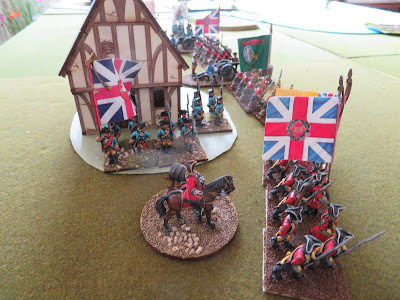In a hall at the palace of Grosschnitzelring, the Fenwickian-Gelderland top brass are about to have their intellects honed - or possibly just disinterred - by engagement with the latest in Enlightenment military science. Carl von Lackwitz, Gelderland's top military philosopher (since the only competition is Horace de Saxe) is here to impart his wisdom, supported by the newly employed purveyor of professional military education, Lady Timsbury of Somerton.
There is a hubbub of voices. There is some excitement amongst the assembled officers, helped by the fact that no ones knows why they are here. On the basis of the evidence, which is that there isn't an enemy army present, the evening seems to have most of what any self-respecting Mittelheim military officer would want - a low chance of fatalities, and a high chance of crudites.
Lackwitz clears his throat. There is a round of applause. This has been a splendid presentation, pitched at just the right level for military aristocrats. The audience starts to disperse.
'No, gentlemen', says Lackwitz with concern, 'no! There's more - you can't go yet!'
The mood in the room immediately sours. This meeting is already exceeding by a dangerous degree the audience's collective attention span. In Fenwick, the desire to reduce the chance of inadvertent double entendre tends to keep public speeches to the point.
'Gentlemen, gentlemen', continues Lackwitz', it is my great pleasure to welcome you to ...'
'Thank you very much, Herr Lackwitz', says Lady Timsbury, ' for your splendid speech; and I'm sure that everyone here appreciates your excellent analysis and amusing anecdotes. Now, there are some points that I would like to make'.
There is more applause - this is more like it! Short; punchy; and also short again. Lady Timsbury quickly summarises what is on offer this evening.
'And so, gentlemen', she finally concludes, 'for a modest pecuniary outlay, this scheme of study will guarantee you victory in war and also, more importantly, give you some impressive post-nominals from the very best English university'.
'Oooh, Hull?' pipes up one of the officers.
Lady Timsbury pauses, just long enough to count to ten. 'No, no, as I keep saying, not Hull: all you will get from Hull are fleas. These post nominals will be from the "King's College"'.
Prince Joachim frowns. 'But I've already got a degree from there!'
'So, you have studied in England, sir?' asks Lady Timsbury with interest.
'Oh no', replies Joachim. 'Why would I want to go there? No, they gave me recognition of prior learning. Once they gave me the credits due to me as the son of an emperor, I received the qualification by return of post'.
Lady Timsbury frowns. 'And there was nothing else?'
'Well, there was the money that I gave them, obviously'.
'But not any actual study of war or science?'
'Well, there was the money that I gave them, obviously'.
'Or an exam or something?'
'Did I mention the money that I gave them?'
Lady Timsbury considers this. 'Do you have any pets, sir?'
'Well, there's my codpiece', replies the prince.
'Excellent! Well, perhaps we could enrol that instead. Education should be available to all. Now ...' she turns to the board 'let's look at some of the basics ...'
Lady Timsbury suddenly stares. 'Lackwitz, I think that you've spelled 'sequel' incorrectly'.
Lackwitz tuts. 'Dammit - did I put too many 'S's in it again?'
'No, because fewer 'S's would just make it 'equal'.
Lackwitz squints at the board. 'Perhaps I meant "sequins"'.
'Branches and sequins?' retorts Lady Timsbury. 'Are you going ballroom dancing with a tree?' She walks to the board sighing. 'Now, everyone, how would you define a clear and attainable end state in your coming campaign against Rotenburg?'
There is silence; although, if gormless mystification made a sound, that silence would be deafening.
'Er ...' says a voice thinly, 'We wish clearly to end the state of Rotenburg?'
Lady Timsbury nods. 'Excellent. Now, what is their centre of gravity?'
'What's gravity?' asks another voice.
'It explains why, when heads are cut off, they fall to the ground' answers another.
'Isn't that because they aren't attached to a neck any more?'
There is a clamour of voices as others begin to contribute to this fascinating scientific discussion.
'Silence!' demands Lady Timsbury. 'Any talking or disagreeing with me and I shall flick your genitals with this metal ruler of mine!'
'Is that allowed?' asks a voice. 'That doesn't seem like it should be allowed!'
'Is it an English thing!'
'She is very domineering!'
Yes, as an infantry officer, I find it quite exciting. If I'd known professional military education was going to be like this, I'd have signed up earlier!'
For Lady Timsbury, it is a long evening. But, armed with professional military education, muskets, and their reputation as the "Spartans of Mittelheim", the army of Fenwick-Gelderland is finally prepared for its next military operation. The next day, after a quick military parade, kept mercifully melon-free, the army commences its advance on Schrote, where the Rotenburg army is currently encamped!









.JPG)
.JPG)
.JPG)
